
Additional Information
Book Details
Abstract
`A densely packed book with interesting and valuable research gleaned from a wide variety of therapy approaches, Narrative and Psychotherapy furnishes the reader with a cogent historical appraisal of the way psychotherapy, culture and storytelling fit together.... A good reference book for counsellors and students.... The authors' students, and clients, must be very happy that he has the interest and the capacity to tune in to others in such a fresh manner' - Counselling, The Journal of the British Association for Counselling
The core of psychotherapy can be seen as a process in which the client comes to tell, and then re-author, an individual life-story or personal narrative. The author of this book argues that all therapies are, therefore, narrative therapies, and that the counselling experience can be understood in terms of telling and retelling stories. If the story is not heard, then the therapist and the client are deprived of the most effective and mutually involving mode of discourse open to them.
Taking a narrative approach also requires thinking about the nature of truth, the concept of the person, the relationship between therapist and client, and the knowledge base of psychotherapy. John McLeod examines the role and significance of stories in psychotherapy from within a broad-based cultural and theoretical framework.
`This is a very good book, representing a really enormous heave forward in our discussions of psychotherapy... it is crucially important to the big questions. At one point McLeod makes the point that the enormous compendium on research in psychotherapy by Bergin and Garfield (4th edition 1994) contains in its index not one reference to narrative or storytelling. I can't believe that the same will be said of the 5th edition, now that this book has appeared' - Self & Society
`The book... ranges over wide areas and renders comprehensible large amounts of frequently complex material. Narrative is seen... as a bedrock of all counselling practice... Narrative therapy in general, and McLeod's book in particular, are constructions whose moment has come. As so often, McLeod brings both sophistication and lightness of touch to his contribution to the counselling literature' - British Journal of Guidance and Counselling
`A densely packed book with interesting and valuable research gleaned from a wide variety of therapy approaches, Narrative and Psychotherapy furnishes the reader with a cogent historical appraisal of the way psychotherapy, culture and storytelling fit together.... John McLeod's awareness of old and very new counselling practices, which underscore the importance of the client's narrative within a social and cultural context, is well explored and stimulating. There is an extensive bibliography and case examples. A good reference book for counsellors and students, it provides exposure to different points of view about the relationship between narrative and psychotherapy.... The authors' students, and clients, must be very happy that he has the interest and the capacity to tune in to others in such a fresh manner' - Counselling, The Journal of the British Association for Counselling
`The "turn to meaning" in psychotherapy... is everywhere in evidence. Its most powerful manifestation in the therapeutic sphere is in the domain of narrative. We owe John McLeod an enormous debt for weaving together the disparate threads of narrative work into a splendidly illuminating tapestry. With a finely tuned sensitivity to history, culture and value, McLeod not only places this work into critical perspective, but moves discussion significantly forward. This is essential reading' - Kenneth J Gergen
`Easy yet thought-provoking reading. While highly recommended for any practicing therapist, Mcleod also provides a strong foundation for researchers seeking to explore the role of narrative in therapy and/or the connections between narrative and society. Both types of future research are necessary to satisfy two key aspects of McLeod's agenda: creating therapists skilled in perceiving differences in story construction and performance, and using therapy `as a means of discovering the stories that enable us to connect with each other and with the traditions that make us who we are' ' - Discource and Society
